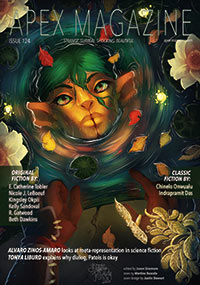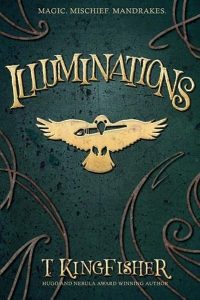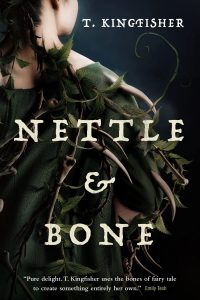Paula Guran Reviews Short Fiction: Uncanny and Apex
Uncanny #40 is full of good fiction. Fran Wilde‘s novelette “Unseelie Brothers, Ltd.” leads off. Gowns made by the legendary Unseelie Brothers atelier have brought everyone in Sera Sebastian’s life together: her Aunt Vanessa and her husband, her father and her mother (who vanished not long after Sera’s birth). The shop, which disappears for periods of time and then appears at varying locations, pops up just in time for Vanessa to have them design a dress for her daughter Rie. Rie would prefer that cousin Sera do her gown and fellow fashion student Sara could use the commission. She accepts despite her need to finish her senior project. The talented Sera is offered a permanent position as well as information about her mysterious missing mother. It’s a wonderful story with a happy ending.
In “Proof of Induction” by José Pablo Iriarte, Paulie needs to solve the Perelman Hypothesis in order to gain tenure. He continues to work on it with his dead mathematician father’s Coda, a simulacrum of his father’s memories and personality. Paulie pursues the theorem as his interaction with his deceased parent reminds him of how distant his father was. Solid story about family and relationships.
The woman’s purse in “Thirteen of the Secrets in My Purse” by Rachel Swirsky contains some odd things including a passport that vacations without its owner, keys that transform, and a compact that talks. Ultimately, an adventure is offered. This is a captivating little tale.
Eugenia Triantafyllou‘s “How the Girls Came Home” features Amalia, who “likes who she is with or without a husband.” She also doesn’t mind that her feet keep transforming into those of various animals. Her father is concerned for what he sees as a husbandless future, so when the Artisan leaves her shoes that he hopes will change her feet to human, she tries them. They never work. Meanwhile, girls from the village keep disappearing and the Artisan is not as helpful as he appears. Amalia turns out to be a heroine worthy of respect.
Aey, in “The Hungry Ones” by Emma Törzs, seeks revenge against a faithless wife, turning to The Hungry Ones for killing magic. They cannot cast spells of death or make Aey bold enough to murder his wife’s lover himself. They can, however, manifest his Shadow-side, externalizing the darkness within him so he can act. Magic, as we should know by now, seldom works as one expects. Törzs twists her tale in interesting and unexpected ways.
Young Komal sees things differently than others and finds magic one night in Shveta Thakrar‘s “Heart Shine“. She seeks it out over and over, but never finds it again. Komal finds an incantation that promises a return of the magic, even as it cautions “she would cease to be Komal within the boundaries of Faerie.” Her parents ignore her, as do the kids at school – at least those who don’t bully her – so, she decides, what has she got to lose? A lovely story about a girl discovering friendship and herself.
Apex #124 offers five original stories. In “Without Wishes to Bind You” by E. Catherine Tobler, Michael and his leprechaun, Pudgy, seek Heather, the woman Michael loves but left and now cannot find his way back to. The editor refers to this melancholy story as a “dystopian fantasy,” which is as good a label as any for a story set in a world that seems to be a ruined version of our own – but with leprechauns. It’s unique and fascinating. R. Gatwood‘s “How to Be Good” features Renward who, as a child, promised to be good. As an adult he serves the greater good by helping to enforce the American Honesty and Integrity Act. He is called in to help interrogate environmentalist troublemakers and other accused terrorists. His methods are not spelled out in the story, but enough is related for the reader to understand this chilling dark morality tale and react to it.
“What Sisters Take” by Kelly Sandoval concerns three sets of female twins who are all born one night, even though the mothers were expecting singletons. As they grow up, the unexpected girls dominate and eventually display strange characteristics that endanger their siblings. Jessi, the narrator, seems safer with her sister, Claire, than the other girls with their cuckoo twins. But when Claire will not help one of the weaker twins, Jessi takes matters into her own hands, with fatal results.
At one point, the college-age protagonist thinks: “Worse things could happen” in Nicole J. LeBoeuf‘s “Survival, After“. And, indeed, they do. The world turns into a nightmare of feral cars, killer trees with “cthuloid” roots, and carnivorous grass. Parents and siblings are all gone. How does one survive? I’m not sure the story answers the question it poses, but it does capture the reader’s attention with vivid imagery.
“Osu” by Kingsley Okpii is my favorite of the issue. Ike is a youth who has been banished to the village of Obodo Osu as an Osu, a vessel for the Aro deity Min-ochi. The other older Osu seem content, but Ike chafes under the storytelling/instruction of Mma Ukwu and yearns to see his mother and sister again. He returns to his village, but no one there remembers him. Returning to Obodo Osu, he seeks answers from Mma Ukwu and learns a great deal. Evidently based in the traditional religious practices and cultural beliefs of the Igbo people of what is now known as Southern Nigeria, this is a well-told timeless and relatable tale.
In “Eikan is Forever” by Beth Dawkins, a generational ship has traveled back to where Earth should be, but there is nothing left. After centuries, the current generation of humans require the ship’s “proper maintenance,” or at least some of them do. The ship suddenly develops impossible “programming errors” and we learn more of those humans. This is an interesting SF story that seems condensed from something larger.
Paula Guran has edited more than 40 science fiction, fantasy, and horror anthologies and more than 50 novels and collections featuring the same. She’s reviewed and written articles for dozens of publications. She lives in Akron OH, near enough to her grandchildren to frequently be indulgent.
This review and more like it in the August 2021 issue of Locus.
 While you are here, please take a moment to support Locus with a one-time or recurring donation. We rely on reader donations to keep the magazine and site going, and would like to keep the site paywall free, but WE NEED YOUR FINANCIAL SUPPORT to continue quality coverage of the science fiction and fantasy field.
While you are here, please take a moment to support Locus with a one-time or recurring donation. We rely on reader donations to keep the magazine and site going, and would like to keep the site paywall free, but WE NEED YOUR FINANCIAL SUPPORT to continue quality coverage of the science fiction and fantasy field.
©Locus Magazine. Copyrighted material may not be republished without permission of LSFF.








